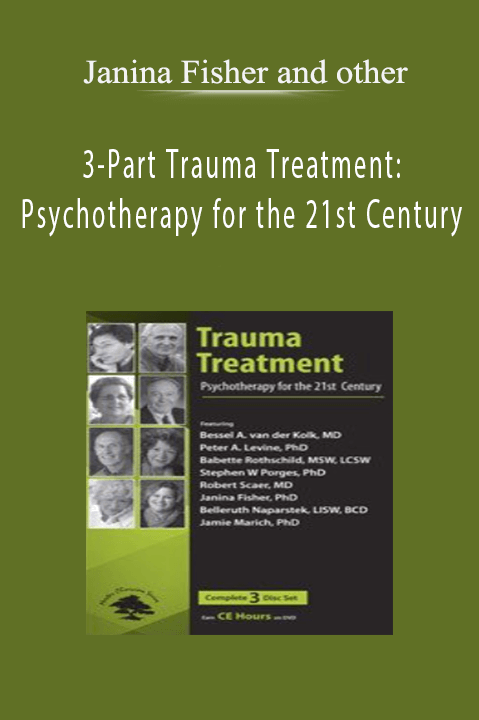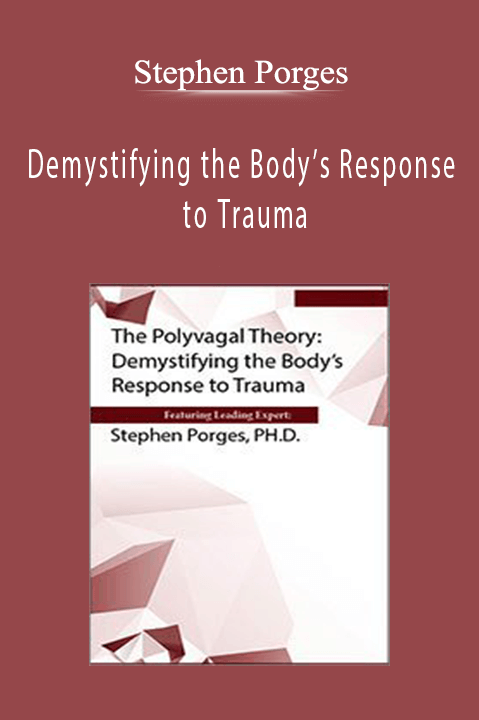$59.00 Original price was: $59.00.$25.00Current price is: $25.00.
Instant Access Available: The Polyvagal Theory: Demystifying the Body’s Response to Trauma – Stephen Porges
You will have immediate access to the digital downloads in your order email. You will also be able to access your downloads from your account dashboard.
Short Description:
This presentation will focus on the restorative power of understanding the adaptive function of stress reactions as an important adjunct to treatment. By deconstructing the biobehavioral features of stress reactions…
Description
The Polyvagal Theory: Demystifying the Body’s Response to Trauma – Stephen Porges
Human responses to trauma and abuse are devastating and compromise subsequent social behavior and emotion regulation. Understanding the mechanisms underlying the “hardwired” response to life threat, may demystify these debilitating consequences. The Polyvagal Theory provides a plausible explanation of how trauma experiences and chronic abuse disrupt homeostatic physiological processes and social behavior and how clinical treatments might be designed to remediate these problems when trauma distorts perception and displaces spontaneous social behaviors with defensive reactions.
This presentation will focus on the restorative power of understanding the adaptive function of stress reactions as an important adjunct to treatment. By deconstructing the biobehavioral features of stress reactions, both client and therapist are better informed in their journey to a successful outcome. The presentation will emphasize the role of “neuroception,” a neurophysiological process through which our nervous system evaluates risk in the environment, without awareness and often independent of a cognitive narrative. Trauma may reset neuroception to protect us from others when there is no “real” danger. The presentation will inform the therapist about how to assess the deleterious consequences of trauma-related experiences by understanding the adaptive psychological, behavioral, and health features of each of the three “Polyvagal” visceral response strategies (i.e., social engagement, mobilization, and immobilization ) and how successful therapeutic interventions promote a neuroception of safety with the consequential improvements in mental and physical health by enabling mobilization and immobilization to occur without fear.
- Describe the principles and features of the Polyvagal Theory
- Discuss the Social Engagement System and how the “brain-face-heart connection” evolved
- Demonstrate at least one specific way to apply Polyvagal Theory in the clinical setting
Get The Polyvagal Theory: Demystifying the Body’s Response to Trauma of author Stephen Porges
Instant Access Available
Downloadable Content

Get Instant Download The Polyvagal Theory: Demystifying the Body’s Response to Trauma – Stephen Porges at imgcap.top Now!
Salepage: https://catalog.pesi.com/item/8521/
Archive: https://archive.fo/wip/SoK7b
4.37
Related Products
-
Sale!
 Rated 3.9 out of 5
Rated 3.9 out of 5Stephen Porges – Clinical Applications of the Polyvagal Theory with Stephen Porges, PhD: Trauma, Attachment, Self–Regulation & Emotions
-
Sale!
 Rated 4.83 out of 5
Rated 4.83 out of 5Stephen Porges, Deborah Dana – Integrating Polyvagal Theory in Clinical Practice with Stephen Porges, PhD & Deb Dana, LCSW
-
Sale!
 Rated 3.63 out of 5
Rated 3.63 out of 5The Neurophysiology of Trauma, Attachment, Self–Regulation & Emotions: Clinical Applications of the Polyvagal Theory – Stephen Porges
-
Sale!

Janina Fisher, Peter Levine, Jamie Marich, Babette Rothschild, Belleruth Naparstek, Robert Scaer, Stephen Porges, Bessel van der Kolk – 3-Part Trauma Treatment: Psychotherapy for the 21st Century


8 reviews for The Polyvagal Theory: Demystifying the Body’s Response to Trauma – Stephen Porges
There are no reviews yet.